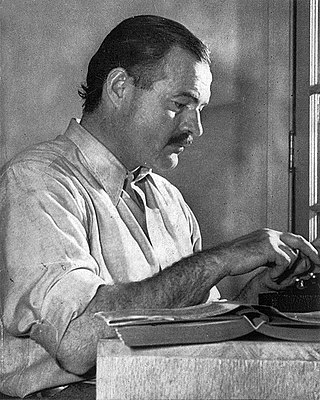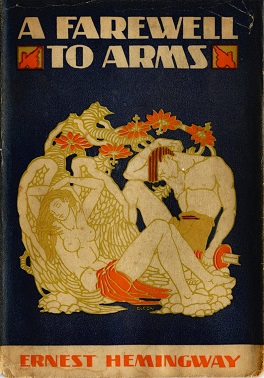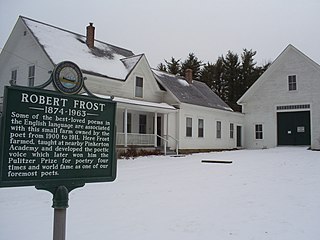
Ernest Miller Hemingway was an American novelist, short-story writer and journalist. Known for an economical, understated style that influenced later 20th-century writers, he has been romanticized for his adventurous lifestyle and outspoken, blunt public image. Some of his seven novels, six short-story collections and two non-fiction works have become classics of American literature, and he was awarded the 1954 Nobel Prize in Literature.

A Farewell to Arms is a novel by American writer Ernest Hemingway, set during the Italian campaign of World War I. First published in 1929, it is a first-person account of an American, Frederic Henry, serving as a lieutenant in the ambulance corps of the Italian Army. The novel describes a love affair between the American expatriate and an English nurse, Catherine Barkley.

Piggott is a city in Clay County, Arkansas, United States. It is one of the two county seats of Clay County, along with Corning. It is the northern terminus of the Arkansas segment of the Crowley's Ridge Parkway, a National Scenic Byway. As of the 2010 census, Piggott's population was 3,849. The town was named after James A. Piggott, one of the early settlers and initiator of the local post office.

Parkersburg is a city in Butler County, Iowa, United States. The population was 2,015 in the 2020 census, an increase from 1,870 in the 2010 census. Parkersburg, although not the county seat, is the highest-populated city in Butler County.

A Moveable Feast is a memoir by Ernest Hemingway about his years as a struggling expatriate journalist and writer in Paris during the 1920s. It was published posthumously in 1964. The book chronicles Hemingway's first marriage to Hadley Richardson and his relationships with other cultural figures of the Lost Generation in interwar France.

Green Hills of Africa is a 1935 work of nonfiction by American writer Ernest Hemingway. Hemingway's second work of nonfiction, Green Hills of Africa is an account of a month on safari he and his wife, Pauline Marie Pfeiffer, took in East Africa during December 1933. Green Hills of Africa is divided into four parts: "Pursuit and Conversation", "Pursuit Remembered", "Pursuit and Failure", and "Pursuit as Happiness", each of which plays a different role in the story.

Elizabeth Hadley Richardson was the first wife of American author Ernest Hemingway. The two married in 1921 after a courtship of less than a year, and moved to Paris within months of being married. In Paris, Hemingway pursued a writing career, and through him Richardson met other expatriate American and British writers.

The Ernest Hemingway House was the residence of American writer Ernest Hemingway in the 1930s. The house is situated on the island of Key West, Florida. It is at 907 Whitehead Street, across from the Key West Lighthouse, close to the southern coast of the island. Due to its association with Hemingway, the property is the most popular tourist attraction in Key West. It is also famous for its large population of so-called Hemingway cats, many of which are polydactyl.

Walloon Lake is an unincorporated community and census-designated place (CDP) in Charlevoix County in the U.S. state of Michigan. The population of the CDP was 271 at the 2020 census. The community is located within Melrose Township.
Hemingway House may refer to:

Pauline Marie Pfeiffer was an American journalist and the second wife of writer Ernest Hemingway.

Crowley's Ridge Parkway is a 212.0-mile-long (341.2 km) National Scenic Byway in northeast Arkansas and the Missouri Bootheel along Crowley's Ridge in the United States. Motorists can access the parkway from US Route 49 (US 49) at its southern terminus near the Helena Bridge over the Mississippi River outside Helena-West Helena, Arkansas, or from Missouri Route 25 (Route 25) near Kennett, Missouri. The parkway runs along Crowley's Ridge, a unique geological formation, and also parts of the St. Francis National Forest, the Mississippi River and the Mississippi Alluvial Plain. Along the route are many National Register of Historic Places properties, Civil War battlefields, parks, and other archeological and culturally significant points.

Gloria Hemingway was an American physician and writer who was the third and youngest child of author Ernest Hemingway. Although she was born a male and lived most of her life publicly as a man, she struggled with her gender identity from a young age. In her 60s, she underwent gender transition surgery, and preferred the name Gloria when possible.

The Robert Frost Farm in Derry, New Hampshire is a two-story, clapboard, connected farm built in 1884. It was the home of poet Robert Frost from 1900 to 1911. Today it is a New Hampshire state park in use as a historic house museum. The property is listed in the National Register of Historic Places as the Robert Frost Homestead.

The Ernest Hemingway Cottage, also known as Windemere, was the boyhood summer home of author Ernest Hemingway, on Walloon Lake in Michigan, United States. It was declared a National Historic Landmark in 1968.

Patrick Miller Hemingway is an American wildlife manager and writer who is novelist Ernest Hemingway's second son, and the first born to Hemingway's second wife Pauline Pfeiffer. During his childhood he travelled frequently with his parents, and then attended Harvard University, graduated in 1950, and shortly thereafter moved to East Africa where he lived for 25 years. In Tanzania, Patrick was a professional big-game hunter and for over a decade he owned a safari business. In the 1960s he was appointed by the United Nations to the Wildlife Management College in Tanzania as a teacher of conservation and wildlife. In the 1970s he moved to Montana where he managed the intellectual property of his father's estate. He edited his father's unpublished novel about a 1950s safari to Africa and published it with the title True at First Light (1999).

The Paris Wife is a 2011 historical fiction novel by Paula McLain which became a New York Times Bestseller. It is a fictionalized account of Ernest Hemingway's marriage to the first of his four wives, Hadley Richardson. McLain decided to write from Hadley's perspective after reading A Moveable Feast, Hemingway's 1964 posthumously published account of his early years in Paris. McLain researched their biographies, letters, and Hemingway's novels. Hemingway's 1926 novel The Sun Also Rises is dedicated to Hadley and their son.
Netcott-Pfeiffer House is a historic building located in Parkersburg, Iowa, United States. The Italianate style double house was built in 1894 by George Netcott, Jr. and his son George A. Netcott. Harry E. Netcott, another of George Jr.'s sons, is believed to have designed the house. George A. Netcott sold the house in 1896 to Gustavus A. Pfeiffer, a pharmacist, and his brother Paul, a local banker and land baron. The brothers, who were also humanitarians and philanthropists, lived here together with their families until Gustavus moved to St. Louis in 1901. Paul's daughter Pauline was a journalist and the second wife of Ernest Hemingway. She lived in the house from 1896 to 1901. The house is also associated with physicist Edwin Thompson Jaynes, who lived here from 1929 to 1942 with his mother after his father's death. The house was listed on the National Register of Historic Places in 2007.
The Spear-O-Wigwam Ranch is a former dude ranch, now a campus of Sheridan College, Wyoming, the Spear-O-Wigwam Mountain Campus. It was listed on the National Register of Historic Places in 2016. It is located at the southeast end of Park Reservoir, about two miles north of Cloud Peak Wilderness Area at altitude of 8,300 feet (2,500 m).
The Ernest and Mary Hemingway House, in Ketchum, Idaho, is listed on the National Register of Historic Places in 2015. The National Register does not disclose its location but rather lists it as "Address restricted." The property is the last undeveloped property of its size within the city limits of Ketchum.

















